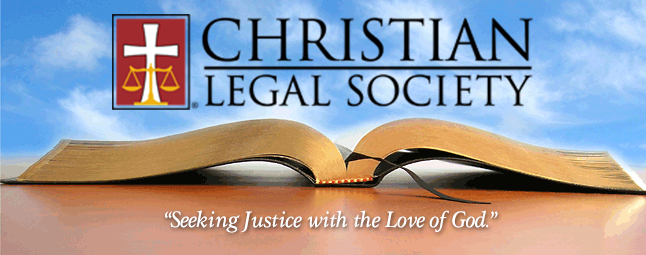The Christian Legal Society is a grassroots organization of Christian lawyers and law students established in 1961 in Chicago.
Christian Legal Society tries to turn legal profession into service to Christ
It is committed to “proclaiming, loving and serving Jesus Christ…in the practice of law, and advocating biblical conflict reconciliation, legal assistance for the poor and the needy, religious freedom and the sanctity of human life.”
Its core purpose is to transform the legal profession into faithful service to Jesus Christ through “the diligent study and ethical practice of law by ministering to the poor, reconciling people in conflict, defending life and protecting the religious liberties of all people.”
CLS is a sophisticated and organized interest group, like many other New Christian Right organizations. It is active at the local and national levels in a number of different areas and in various formats. CLS is highly evangelical. It encourages relationships with other like-minded organizations and helps many of them legally. It was a founding member of the Evangelical Council for Financial Accountability (ECFA), which attempts to ensure fiscal accountability among Christian nonprofit organizations.
CLS organizes bible studies, produces journals and other publications, and maintains the Center for Law and Religious Freedom in Washington, D.C.
Christian Legal Society active in First Amendment litigation
The center engages in amicus briefs filings, legislative advocacy, and public education. It also represents clients in religious liberty lawsuits and provides legal aid. It has filed more than 75 amicus briefs since 1977, many of them in First Amendment cases.
The center has been involved in federal legislation regarding faith-based initiatives, the Workplace Religious Freedom Act and the Marriage Protection Acts, both proposed in 2005.
Many CLS chapters at law schools face criticism or are unrecognized because of membership rules that have been deemed to be discriminatory.
Rights of association questioned in Christian Legal Society case
For example in Christian Legal Society v. Martinez, 561 U.S. ____ (2010), the U.S. Supreme Court allowed the law school at the University of California at Hastings to deny registering its CLS as a “Registered Student Organization,” which would have entitled it to use its facilities and financial assistance collected through mandatory fees.
Justice Ruth Bader Ginsburg’s decision, however, focused on the “permissibility” rather than on the “advisability” of the university’s actions, and Justice Samuel Alito penned a strong dissent in which he suggested that the University was enforcing its “all comers policy” selectively and that it therefore interfered with the group’s right of association.
This article was originally published in 2009 and updated in 2017. Kathryn Oates was a doctoral student at the University of Florida.

